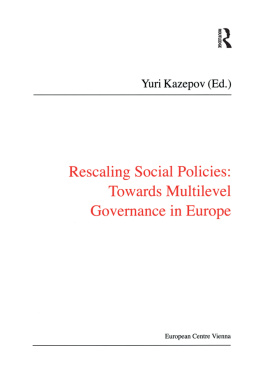Rescaling Social Policies: Towards Multilevel Governance in Europe
Public Policy and Social Welfare
A Series Edited by the European Centre
Volume 38
Yuri Kazepov (Ed.)
Rescaling Social Policies: Towards Multilevel Governance in Europe
First published 2010 by Ashgate Publishing
Published 2017 by Routledge
2 Park Square, Milton Park, Abingdon, Oxon OX14 4RN
711 Third Avenue, New York, NY 10017, USA
Routledge is an imprint of the Taylor & Francis Group, an informa business
Copyright European Centre Vienna, 2010
All rights reserved. No part of this book may be reprinted or reproduced or utilised in any form or by any electronic, mechanical, or other means, now known or hereafter invented, including photocopying and recording, or in any information storage or retrieval system, without permission in writing from the publishers.
Notice:
Product or corporate names may be trademarks or registered trademarks, and are used only for identification and explanation without intent to infringe.
Copy-editing and DTP: Willem Stamatiou
European Centre for Social Welfare Policy and Research
Berggasse 17, 1090 Vienna, Austria
British Library Cataloguing-in-Publication Data. A catalogue record for this book is available from the British Library.
ISBN 13: 978-1-4094-1021-8 (pbk)
To Matti Heikkil ()
A good friend and a brilliant researcher
Contents
- Chapter 1
Rescaling Social Policies towards Multilevel Governance in Europe: Some Reflections on Processes at Stake and Actors Involved
- Chapter 2
Activation and Rescaling: Interrelated Questions in Social Policy? - Chapter 3
A Comparative Perspective on Labour Market Changes - Chapter 4
Actors, Scaling and Governance in Activation Policy
- Chapter 5
Social Assistance Policy Models in Europe: A Comparative Perspective - Chapter 6
The Territorial Organisation of Social Assistance Schemes in Europe - Chapter 7
Actors and Governance Arrangements in the Field of Social Assistance
- Chapter 8
Familiarisation and Regional Variation in Long-Term Care Provision. A Comparative Perspective on Long-Term Care for Older People in Europe - Chapter 9
The Territorial Dimension of Long-Term Care for Older People - Chapter 10
Actors and Governance Arrangements in Long-Term Care for Older People
- Chapter 11
Rescaling Processes in Europe: Convergence and Divergence Patterns towards Multilevel Governance? - Chapter 12
The Coordination Challenge - Chapter 13
Rescaling of Social Welfare Policies: Lessons and Future Perspectives
- Chapter 1
Rescaling Social Policies towards Multilevel Governance in Europe: Some Reflections on Processes at Stake and Actors Involved
- Chapter 2
Activation and Rescaling: Interrelated Questions in Social Policy? - Chapter 3
A Comparative Perspective on Labour Market Changes - Chapter 4
Actors, Scaling and Governance in Activation Policy
- Chapter 5
Social Assistance Policy Models in Europe: A Comparative Perspective - Chapter 6
The Territorial Organisation of Social Assistance Schemes in Europe - Chapter 7
Actors and Governance Arrangements in the Field of Social Assistance
- Chapter 8
Familiarisation and Regional Variation in Long-Term Care Provision. A Comparative Perspective on Long-Term Care for Older People in Europe - Chapter 9
The Territorial Dimension of Long-Term Care for Older People - Chapter 10
Actors and Governance Arrangements in Long-Term Care for Older People
- Chapter 11
Rescaling Processes in Europe: Convergence and Divergence Patterns towards Multilevel Governance? - Chapter 12
The Coordination Challenge - Chapter 13
Rescaling of Social Welfare Policies: Lessons and Future Perspectives
Guide
| Figures |
| Chapter 1 |
| Chapter 5 |
| Chapter 6 |
| Chapter 11 |
| Appendix |
| Tables |
| Chapter 1 |
| Chapter 3 |
| Chapter 4 |
| Chapter 5 |
| Chapter 6 |
| Chapter 7 |
| Chapter 8 |
| Chapter 9 |
| Chapter 10 |
| Chapter 11 |
| Appendix |
Yuri Kazepov
This book is the result of the "Rescaling Social Welfare Policies - A comparative study on the path towards multilevel governance in Europe" project. It was a complex comparative project aimed at investigating the changes in both the territorial organisation and the new actors' organisation of selected social policies in several European countries. The project developed under the auspices of the European Centre for Social Welfare Policy and Research in 2005, following an initial stimulus by Matti Heikkil to whom this book is dedicated. Matti, a good friend and a brilliant researcher felt that it was important to investigate these issues in a pioneering project. Indeed, when it started this was one of the very few projects on rescaling social policies. No consolidated knowledge base existed to be used as a reference and many methodological questions remained to be addressed even before starting.
We approached the issue with quite high ambitions in terms of the policies to be considered, the countries to be involved and the methods to be used. We targeted four policies, twelve countries and multiple methods, but ended up with three policies, eight countries and fewer methods. Among the policies we were able to investigate: a) activation policies in the labour market; b) social assistance; and c) long-term care for the elderly. We unfortunately were obliged to drop migration policies. Having too many policies was not only costly, but also complex in terms of management. Among the countries that we were able to involve in the project are Finland, France, Italy, Norway, Poland, Spain, Sweden and Switzerland. Unfortunately Denmark, Germany, the Netherlands and the United Kingdom did not get funded by those countries' respective national agencies and were not able to participate in the study. This was a pity, because the territorial dimension of social policies was becoming particularly relevant in their respective political debates. We had originally also planned the use of the EUROMOD tax benefit micro-simulation model for identifying the redistributive impact of territorial reforms. Unfortunately, however, the person assigned to this part of the project left the European Centre and it proved very difficult to replace him.
Despite the aforesaid resizing of the project, the countries we investigated, the policies we have considered and the methods used are relevant and interesting in relation to our understanding of the territorial dimension of social policies and of the new governance arrangements.
Some additional complications arose, however. The project partners did not know each other before starting the project and the funding was distributed unevenly among them. In fact, the funding mechanism of the project (see below) foresaw that each country had to finance its own part of research. This naturally led to different levels of funding for the different partners, who were first and foremost responsible towards their fund-givers. These challenges contributed to the complexity of the project and required several meetings not only to define the conceptual and methodological frame, but also to ease collaboration among the numerous partners.












